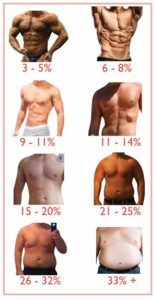Today, so many guys prioritize aesthetics over genuine, lasting, health. Many men find themselves chasing the lowest possible body fat percentage, thinking it’s the ultimate sign of fitness. But what if I told you that having an ultra-low body fat percentage might not be what your body needs to perform at its best? In fact, going too low can actually lead to health complications, while a balanced body fat percentage tailored to your genetics – not some guy’s that you see online or at your local gym – and lifestyle can support long-term vitality and performance.
This blog will break down what body fat percentage is, what a realistically healthy goal looks like for guys, and why solely chasing extreme leanness can seriously backfire.
What Exactly is Body Fat Percentage?
Before diving into healthy targets and the pitfalls of going too lean, we need to fully understand what body fat percentage represents. Body fat percentage refers to the proportion of fat mass relative to your total body weight. For example, if you weigh 180 pounds and 30 pounds of that weight is fat, your body fat percentage would be 16.7%.
Unlike the Body Mass Index (BMI), which only takes height and weight into account, body fat percentage is a more accurate measurement of fitness and health. While BMI can lump muscular men into the same category as those with excess fat, body fat percentage gives a clearer picture of your body composition and overall health.
Do We Need Fat?
Yes, we all need fat – our body requires it for several important functions:
-
- Energy Storage: Fat stores energy that your body can tap into when needed.
-
- Insulation: Fat helps regulate body temperature.

- Insulation: Fat helps regulate body temperature.
-
- Hormone Production: Many hormones, including testosterone, require a certain level of fat to be produced and regulated properly.
-
- Protection: Fat acts as a cushion for vital organs.
Having some fat is essential for survival, but determining how much is too much – or too little – is where things get a bit tricky.
Healthy Body Fat Percentage for Men
The “ideal” body fat percentage varies based on factors such as age, genetics, and activity level. But there are general guidelines that can help men set realistic goals:
-
- Athletes: 6-13%
-
- This range is common among professional athletes and bodybuilders. However, it’s not sustainable or healthy for most men to maintain year-round without strict discipline.

[Image sourced from Quora]
- This range is common among professional athletes and bodybuilders. However, it’s not sustainable or healthy for most men to maintain year-round without strict discipline.
-
- Athletes: 6-13%
-
- Fitness Enthusiasts: 14-17%
-
- This range reflects men who are active and in shape but not at extreme levels of leanness. It’s often associated with good health, vitality, and appearance.
-
- Fitness Enthusiasts: 14-17%
-
- Average Men: 18-24%
-
- While less “cut” than the fitness enthusiast category, this is still within a healthy range. Many men who focus on moderate exercise and a balanced diet will find themselves here.
-
- Average Men: 18-24%
-
- Overweight: 25% and above
-
- At this level, fat stores start to affect health, including increased risk for conditions like diabetes, heart disease, and joint issues. Weight loss may be necessary for overall health improvement.
-
- Overweight: 25% and above
For most men, aiming for a body fat percentage somewhere between 10-20% is a realistic and healthy goal. It’s also a range that’s easier to maintain long-term without compromising your energy levels, mental health, or lifestyle.
The Pitfalls of Extremely Low Body Fat
While society often glamorizes having visible six-pack abs and minimal body fat, achieving and maintaining a body fat percentage below 10% can have serious downsides. Many fitness models and bodybuilders appear shredded for photo shoots or competitions, but very few stay that way year-round because it’s unsustainable and can even be dangerous.
Here are some of the risks of chasing extremely low body fat:
Hormonal Imbalances
Low body fat levels can disrupt the production of essential hormones like testosterone. Testosterone plays a vital role in everything from muscle growth and sex drive to mood regulation. Men who drop too low in body fat may experience a sharp decline in testosterone, leading to low energy, decreased libido, and even depression.
Compromised Immune Function
Fat cells produce important cytokines, molecules that help regulate the immune response. With very low body fat, your body may struggle to fight off infections and heal wounds properly.
Reduced Energy Levels
Body fat serves as an energy reserve. When you’re too lean, your body doesn’t have enough fat to tap into during periods of intense physical activity or stress, which can lead to chronic fatigue, irritability, and even burnout. Low energy also means longer recovery times after workouts.
Mental Health Decline
Maintaining extremely low body fat can take a toll on your mental health. The discipline required to stay ultra-lean can lead to stress, anxiety, and even obsessive behaviors around diet and exercise. Additionally, low fat levels can lead to decreased serotonin production, affecting mood and emotional stability.
Bone Health
Fat helps regulate bone health by promoting the absorption of key nutrients like calcium and Vitamin D. Very low body fat can result in decreased bone density, making you more susceptible to injuries like fractures.
Poor Sleep
Hormonal imbalances caused by extremely low body fat, particularly reductions in testosterone and cortisol dysregulation, can negatively affect sleep quality. Poor sleep, in turn, can compound the other negative effects, including lowered testosterone and compromised recovery.
The Role of Genetics in Body Fat
Genetics plays a significant role in determining the range of body fat that’s healthy and sustainable for you. Some men naturally have a leaner build, while others may carry more fat, even when they’re fit and active. A Viking is likely going to have more body fat than an African warrior – the same thing goes for their descendants.

Trying to achieve a body fat percentage that’s far below what your genetics allow can lead to burnout, injury, and frustration. It’s essential to recognize that not all men are designed to walk around with 8% body fat – and that’s okay. The key is to find a healthy balance that works for your body and supports both physical and mental well-being.
Finding The Right Balance for You
So, how do you strike the right balance between being fit and healthy without sacrificing your well-being? The answer lies in sustainability. Here are a few tips to help you maintain a healthy body fat percentage without falling into the trap of extremes:
1. Focus on Performance, Not Just Aesthetics
-
-
Aim to feel strong, energized, and capable in your daily life. Performance-based goals, such as improving your strength, endurance, or athletic skills, are often better markers of health than chasing a specific look.
-
2. Prioritize Nutrient-Dense Foods
-
-
Eat a diet rich in whole, unprocessed foods that fuel your body. Prioritize lean proteins, healthy fats, and complex carbohydrates to maintain energy levels and promote recovery.
-
3. Train with Balance
-
-
Incorporate a mix of resistance training, cardiovascular exercise, and flexibility work into your routine. This balance ensures that you’re building strength, endurance, and mobility without overtaxing your body.
-
4. Listen to Your Body
-
-
Don’t ignore signs that your body is under too much stress. Chronic fatigue, mood swings, and prolonged recovery times are all indicators that you may need to adjust your diet or training intensity.

-
5. Monitor Your Health
-
-
Regularly check in with a healthcare provider to monitor key health markers such as hormone levels, bone density, and heart health. These are far better indicators of overall wellness than what’s reflected in the mirror.
-
Closing Thoughts
Achieving a healthy body fat percentage isn’t about hitting the lowest number possible. Instead, it’s about finding a balance that works for your genetics, lifestyle, and long-term goals. While a lean physique might be appealing, staying too lean can negatively impact your hormones, energy levels, and overall well-being. We should aim for a sustainable body fat percentage that supports both physical performance and mental health, and remember – health isn’t just skin-deep.
By focusing on balance, sustainability, and health-first goals, you’ll build a body that’s not only lean but also strong, resilient, and energized for the long game.












